- Home
- Iain Rob Wright
Hell on Earth Trilogy: The Complete Apocalyptic Saga Page 2
Hell on Earth Trilogy: The Complete Apocalyptic Saga Read online
Page 2
“It’s good to see you, Keith. Take a seat, I’ll get you a drink.”
“Nothing for me, thanks. Marcy and I don’t much touch alcohol these days.”
“Really? Good on you both.” Despite his brother’s refusal, Rick went and retrieved his whiskey from the piano and gulped it down, then poured himself a fresh measure from the bottle in the kitchen. Back in the living room, he found Keith spread out on the couch like it was his own.
Rick perched on the other couch. “So, you really don’t drink?”
“Well, you know how it is. We don’t want to raise Maxwell thinking that booze is an ordinary part of life.”
“You mean like dad raised us?”
“Oh, come on, Rick. Dad was never as horrid as you make him out.”
“You’d gone to university by the time he was really bad. I was thirteen. I’m the one who got to see the bastard he turned into—I’m the one who got to watch him knock mum about.”
Keith sighed. “Mum and dad’s marriage was nothing to do with us.”
“Anyway,” Rick changed the subject, “how is Maxwell? He must be—what?—four by now?”
“Four in October. He’ll be starting school soon, though I think he’s ready now. He’s so smart, Rick. I tell you, he’ll be Prime Minister one day.”
“Must take after you. You’ve always been driven.”
Keith looked smug, and Rick chided himself for kneading his brother’s ego. Rick could be King of the Universe and Keith wouldn’t give him the slightest congratulation, so why was he throwing his brother a bone? Rick still remembered the look of devastation on Keith’s face when he’d signed his record deal. No happiness, no pride in his younger brother’s accomplishments—just resentment and anger. Rick became the rich and successful brother, and Keith detested it. When it’d all inevitably gone down the pan, Keith’s transparent glee almost ended their relationship. Perhaps it should have, but Rick had allowed himself to fall back into the old routine—Keith turning up his nose at everything he did, and him trying to act like he didn’t notice.
“So, why are you here, Keith? I haven’t seen you in over a year—since Tabitha got married.”
“Tabby’s already divorced. I could have told you it was on the cards the moment they said their vows. He was a carpenter.”
Rick frowned. “So?”
“Just saying. Chap didn’t have much going on. Tabby wanted more.”
“She told you that, did she?”
Keith shrugged. “It was obvious.”
“So why are you here?” Rick demanded. “Not to talk about our cousin’s divorce, I’m sure.”
“Can’t I just drop by to see my little brother? I wanted to check in on you, make sure you hadn’t hanged yourself in this big empty mansion.”
“Why would I hang myself?”
“Because… Well, you know.”
“What? Because I lost my record deal and haven’t been able to get another one? Or because they make funny videos on the Internet about how cheesy my one and only hit song was. Rick Astley called me the other day and thanked me for replacing him. Should I just hang myself?”
“I never said that.”
Rick knocked back his whiskey and went to get another one. “Maybe I’ll kill myself when my money runs out. Fortunately, I made a shitload of it, so that will probably never happen. Least I’m a stinking rich failure, huh?”
“Rick, come on…”
Rick stormed off into the kitchen. Once he’d poured himself a fresh drink, he placed his elbows on the counter and held his head in his hands. If Keith thought he was depressed, it was because he damn well was. Suicide, though, had never crossed his mind. As much as he hated the sour turn his life had taken, he had made it once. He’d been top of the charts and saw his face printed on the cover of Rolling Stone Magazine. Most musicians only dreamt of getting a shot like he had, and whether it had lasted or not, Rick had been lucky. For that reason alone, he was proud. It was just difficult finding self-respect when you were a one-hit wonder. If a man made a fortune by selling a business and retiring at thirty, he was forever successful, but if a musician got rich off one song and then hung up his guitar, he was a joke—his short career became a punchline. People enjoyed watching celebrities fall—it was modern blood sport—and while Rick had been a celebrity for all of five minutes, he had fallen hard.
“…grizzly scene discovered just outside the Devonshire village of Crapstone.”
Keith walked into the kitchen. “Hey, Rick, I’m sorry if I upset you.”
“Quiet a second. They’re talking about something that’s happened in Crapstone. That’s only a few miles from here.”
Keith pulled up a stool next to Rick, and they both watched the television while the news report continued. There was a female reporter standing at the base of a grassy hill surrounded by police tape. Several men and women in latex gloves hurried around, working on something out of sight.
“Atop this small hill, the body of pensioner, Elizabeth Creasy—a retired local businesswoman—was found dead; her eyes badly mutilated in what police are suspecting was a premeditated and personal attack.”
Rick scrunched up his face. “Poor lady.”
“She must have annoyed the wrong person,” said Keith.
“Most bizarre,” the reporter continued, “is the presence of a bizarre object found beside the crime scene. A smooth black stone was discovered right next to Mrs Creasy’s body, but all attempts so far to collect it have failed. In fact, several attempts to interact with the stone have resulted in further casualties as two police officers, first to arrive at the scene, both suffered fatal injuries shortly upon touching the object in question. A team of geologists from the University of Exeter are now examining the stone, but their initial studies are yet to provide any insight into its nature. Police are hesitant to draw any conclusions, but this has been a strange and brutal attack in one of the country’s most idyllic locations. I’m Kimberly Wilkins, back to the studio.”
Rick pulled a face. “Horrible.”
Keith shrugged.
“Somebody mutilated her eyes, Keith. I don’t know how a person can…” He sighed and took a nip of whiskey. “And that stone they were talking about... They said they couldn’t collect it. What does that even mean?”
“That it’s heavy. Who cares?”
Rick wasn’t sure why he cared. Perhaps it was because he often felt so isolated and vulnerable here on his own. He sometimes lay in bed at night hearing noises and worrying about robbers creeping around downstairs. That might be why the thought of an old lady being mutilated and murdered just miles away from his home was more than a little unnerving. “I just find the whole thing sad,” he said. “Why would someone do that to a pensioner?”
Keith chuckled. “You always think too much, Rick. I remember when our dog, Cassie, died. You cried in your room for a week. You were such a funny child.”
Rick topped up his whiskey and exhaled into his glass, then took another long swig. He clonked the empty glass down on the counter and took a moment to study his older brother—a slightly plumper, slightly balder version of himself. His previously jet-black hair had lightened towards grey and his nose seemed bigger. “What do you want, Keith? Will you tell me why you’re here? I know it’s not because you missed me.”
Keith rubbed a hand against his stubbled chin. It was unlike him not to be clean-shaven. “Maybe I should have that drink after all, Rick. I’ll have whatever you’re having.”
Rick poured his brother a whiskey in a fresh glass and slid it towards him. “Why are you here for God’s sake? Will you just tell me?”
Keith wrapped his fingers around the whiskey glass and stared down at the oak-coloured contents. “Because I have no place else to go. I need to stay here tonight, Rick. Maybe for a while.”
Rick closed his eyes. He could not have got a worse answer.
~Mina Magar~
Oxford Street, London
“Come on, Mina,” shouted David.
“We need to get there before the others. There won’t be room to swing your elbows soon, and I need those shots.”
Mina kept a firm grip on her camera and fought to keep up. She was fifteen years younger than David, but when there was a story to be had, the man could move like the wind. His yellow hair flowed behind him like a thoroughbred’s mane, and he slipped through the crowd like water through a sieve. All Mina caught were brief flashes of his Argyle socks. She, meanwhile, bumped into people almost every step, and received more than a few dirty looks. She couldn’t help but apologise profusely.
Even on a slow day, Oxford Street was one of the busiest spots in London, and today people were teeming through it like ants. They packed together in small groups, lining the road on both sides. The police were massively outnumbered and struggled to maintain order. The large gathering lacked the festive spirit of, say, a Royal Wedding, and instead held an atmosphere more akin to a kindling riot. People had a look of mischief about them, and several lampposts were skewed as people hung off them like chimps.
David shouted again. “Come on, Mina. I can see those buggers from The Chronicle already there. We can’t let them hog the headlines.”
Mina fiddled with her camera while trying to run. She wanted to have the settings ready for when she started snapping. Her pictures would be used in the Slough Echo, but if she produced something noteworthy, it might spread to bigger outlets, or even go viral. Maybe if she achieved that her father would finally see she was good at her job, and stop telling her to quit all the time.
Not looking where she was going, Mina collided with the square back of a man. The shaved head turned around and glared at her. “Watch where you’re fuckin’ goin’, luv.”
Mina backed up. “Sorry, I’m so sorry.”
When she heard the man mutter the words, ‘Fucking Paki,’ she was stunned. How dare he! She wasn’t even from Pakistan. How could people be so hateful?
“Come on,” David shouted for the third time. “Get moving.”
Mina wanted to say something back to the snarling racist, but instead she ended up smiling nervously and moving on. Much as she would’ve liked to confront him, she wasn’t that person. Even the thought made her stomach churn. So she put the experience behind her and focused on her job.
“I’m right behind you, David,” she shouted as she dodged around a woman with a pram loaded with shopping bags instead of a child. Up ahead, the historic Selfridges building loomed unhappily. Its sleek interior was devoid of shoppers, and the bus shelter out front had been smashed and twisted by enthusiastic oglers trying to climb it.
David pointed ahead, still dodging through the crowd with fluid ease. “We need to hurry, come on. We can’t afford to miss anything.”
“I’m right behind you,” she shouted, even though she was six steps back. They were heading for the Soho Street intersection on the east end of Oxford Street, but they had been forced to get off the tube at Bond Street as Oxford Circus and Tottenham Court Road were closed. It was a long walk on a normal day, but today was a nightmare. It was like squeezing through a corridor of hot, sweaty people, and when she saw Newman Street coming up on her left, she let out a moan of joy. They were only one street away.
“There! I see it,” David shouted.
Mina caught up to him and saw it too. They had arrived at a police cordon outside McDonald’s. A dozen scientists milled around inside the tape as if they hadn’t even noticed the thousand-strong mob surrounding them. They were focused on the strange black stone, curiosity at the forefront of their minds. Mina was fixated on it too, surprised at how unremarkable it was.
Since the first stone had been discovered last night in the village of Crapstone, hundreds more had materialised. Business began as usual that morning in the City of London, but it soon became evident that something strange was afoot. At seven-thirty, a double decker bus had struck a bowling ball-sized stone in the centre of Oxford Street and broken its axle. The driver got out to investigate, and died of a massive and explosive heart attack a second after touching it.
News circulated rapidly after that—panic spreading thick and fast. Identical stones appeared all over the United Kingdom, from Inverness to Plymouth to Norwich to Hull, and Glasgow too. Wales had identified more than a dozen within its borders. Word spread that anyone who touched the stones would immediately die of a heart attack, and that had been the nugget of news to set the nation on edge.
The stones were a threat.
Public alerts were issued: Do not approach the stones and report any discoveries immediately. A hotline was set up too, plastered at the bottom of every news report. New discoveries came in every minute.
The stones were everywhere.
“It’s just a rock.” Mina heard the disappointment in her voice as she spoke. “I was expecting something more… I don’t know. It’s just a rock.”
A leathery-skinned old woman grabbed Mina’s arm, madness in her rheumy eyes, and barked at her. “It’s aliens. They’ve sent ‘undreds of meteorites to Earth to colonise us. That stone is gunna crack open like a coconut and spill its load into the atmosphere, you mark me words. We’re all dead!”
Mina yanked her arm away and rubbed the finger marks left on her skin. She clung to David, but he paid her no attention, focused only on making it past the police cordon. Mina covered her mouth in shock when she saw him knee a child out of his way. The little boy fell to his knees, got up, then went crying to his mummy, arms outstretched and begging to be picked up.
“David, you just hurt a child.”
“The brat shouldn’t have been in the way. Ah, here we are, finally.”
They made it over to a burly police sergeant with a clipboard in his hands. He was grinding his teeth and taking slow, deep breaths. His wide eyes examined David and Mina with suspicion. “Stand back, please.”
“We’re with the Slough Echo,” David snapped.
The sergeant ran a finger down his clipboard and nodded. “Okay, step inside the cordon, but don’t go within six feet of the object.”
David swooped beneath the police tape without another word. Mina took a moment to thank the sergeant before doing the same.
The black stone sat in the middle of the road.
Mina’s tummy churned. It wasn’t hunger—she’d grabbed a hotdog less than an hour ago—it was something else. The mysterious object, just ten feet away from her, had killed people. It was dangerous. She’d been so intent on getting to Oxford Street, that she’d not stopped to consider the peril she was placing herself in. Had the stone been tested for radioactivity, toxicity? Was she in danger just by being close to it? The dozen scientists surrounding the thing did little to assuage her fears.
A tug at her arm pulled her away from her fears. It was David. “Get snapping, girl.”
“Yes, right.” Mina raised her camera and started snapping away, altering and fine-tuning her settings as she went. It was difficult to know how the best photograph would look until she examined the digital reel on her laptop, so she followed the photojournalist’s credo and just kept on snapping. The more pictures she took, the better the chances of getting something valuable. Different angles, different settings, different lenses, but just keep snapping.
David interviewed the police officers, scribbling away furiously on his notepad while they spoke. Usually he would use a tape recorder, but police officers were notoriously shy around recording equipment, and they gave much more away when faced with a simple pencil and pad.
While Mina tried to do her job, a pushy photographer from The Chronicle fought with her for the best angles, hustling her out of the way so often that it almost felt malicious. Mina knew she should hustle the older woman right back, but it wasn’t something she was used to. The other woman carried herself with such confidence and authority that it was hard to resist her. The police officers all smiled and chatted with her, while they had only disapproving glances for Mina. She started to wonder if she would ever find her feet in this job.
S
atisfied that she had got as much as she was going to get, Mina placed her spare lenses back into her hip bag and let her camera hang around her neck. Now that she no longer stared through a viewfinder, the black stone in the centre of the cordon seemed to be alive—less a detached photographic subject, and more an imposing presence that demanded attention. From six feet away, she could see that the surface of it was not jet black, but streaked with delicate grey veins. She wondered what it would feel like if she touched it. It could kill her, she knew that, so why was she so eager to approach it? It was that same feeling she got whenever she stood on a high balcony and peered over the edge. That same voice in her head that always dared her to jump: Just do it!
A batch of shouting broke out behind Mina and made her turn around. The burly sergeant who stood outside the cordon had dropped his clipboard and had begun fighting with a lad in a red hoodie. A skinny girl batted the sergeant with both fists, yelling at him to leave her boyfriend alone. The profanity she used was impressive.
The sergeant applied a headlock, yanking the lad around. “I told you to bloody get back.”
The lad twisted and squirmed, trying to break free. “You have no right, pig! People deserve to know what’s happening!”
The sergeant released the lad’s neck and shoved him backwards. “Move away or I’ll bleedin’ place you under arrest.”
“Fuck you, pig,” the girlfriend shouted.
“Go suck a dick,” said the lad.
“Okay, that’s it.” The sergeant reached to his belt and pulled out a canister of CS gas. He pressed the nozzle and gave the young man a full dose in the face that sent him stumbling backwards, coughing and spluttering. The lad’s girlfriend screeched like a tomcat and pounced on the sergeant with her claws out. The sergeant restrained her easily with his meaty arm, and let her have a dose of the CS gas too. She fell to the floor weeping and scratching at her eyes.
The crowd ignited in anger. Hundreds of yelling voices merged into one, singular accusatory howl.

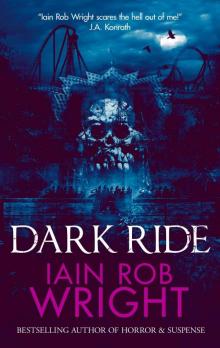 Dark Ride
Dark Ride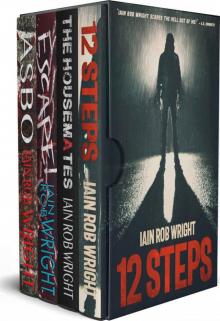 Gripping Thrillers
Gripping Thrillers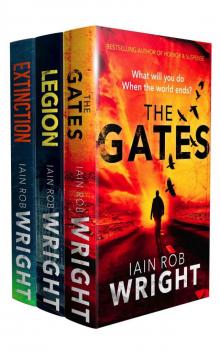 Hell on Earth Trilogy: The Complete Apocalyptic Saga
Hell on Earth Trilogy: The Complete Apocalyptic Saga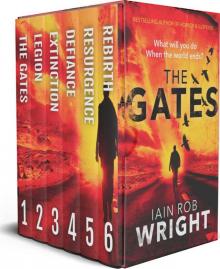 Hell on Earth- the Complete Series Box Set
Hell on Earth- the Complete Series Box Set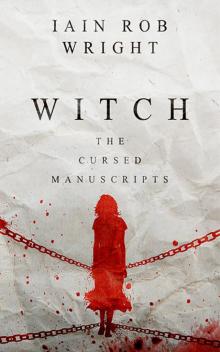 Witch: A Horror Novel (The Cursed Manuscripts)
Witch: A Horror Novel (The Cursed Manuscripts)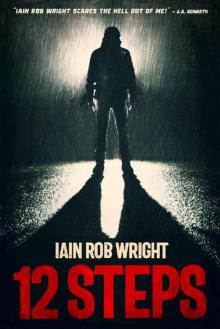 12 Steps
12 Steps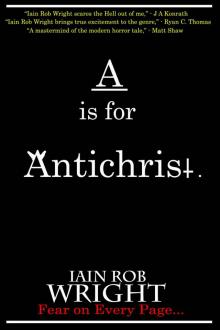 A is for Antichrist
A is for Antichrist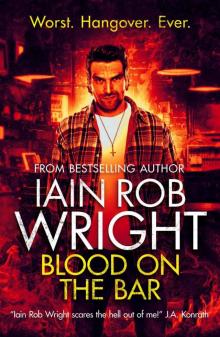 Blood on the Bar
Blood on the Bar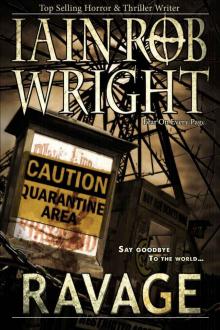 Ravage: An Apocalyptic Horror Novel
Ravage: An Apocalyptic Horror Novel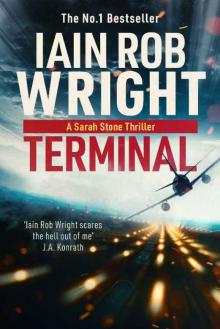 Terminal (Major Crimes Unit Book 4)
Terminal (Major Crimes Unit Book 4)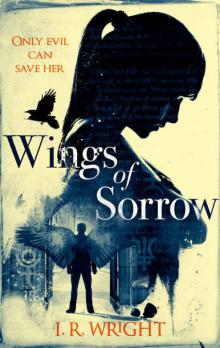 Wings of Sorrow (A horror fantasy novel)
Wings of Sorrow (A horror fantasy novel)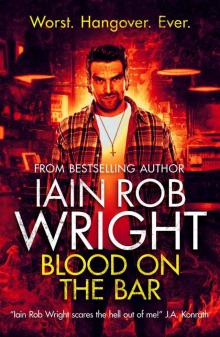 Blood on the Bar (Lucas the Atoner Book 1)
Blood on the Bar (Lucas the Atoner Book 1)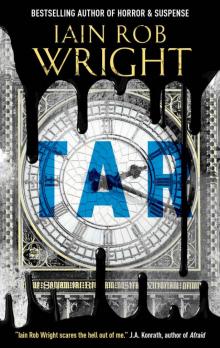 Tar: An apocalyptic horror novella
Tar: An apocalyptic horror novella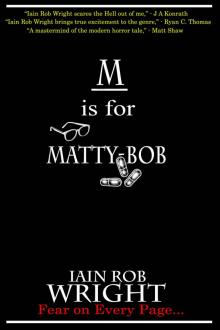 M is for Matty-Bob (A-Z of Horror Book 13)
M is for Matty-Bob (A-Z of Horror Book 13)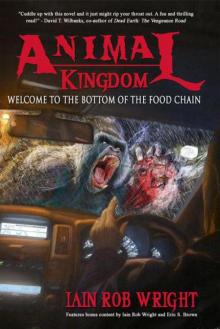 Animal Kingdom
Animal Kingdom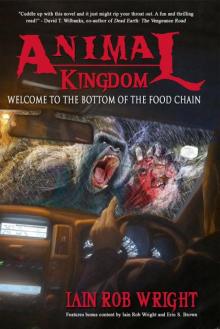 Animal Kingdom: An Apocalyptic Horror Novel
Animal Kingdom: An Apocalyptic Horror Novel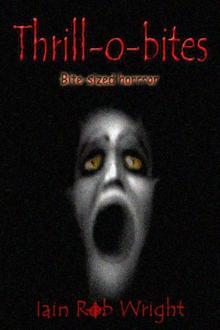 Thrillobytes: bite-sized horror
Thrillobytes: bite-sized horror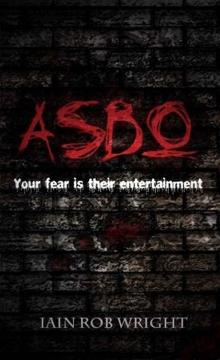 ASBO: A Thriller Novel
ASBO: A Thriller Novel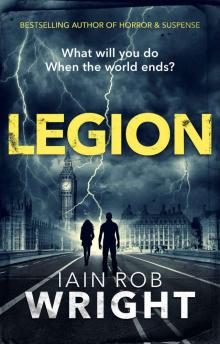 Legion: An Apocalyptic Horror Novel (Hell on Earth Book 2)
Legion: An Apocalyptic Horror Novel (Hell on Earth Book 2)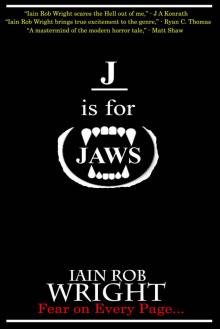 J is for Jaws (A-Z of Horror Book 10)
J is for Jaws (A-Z of Horror Book 10)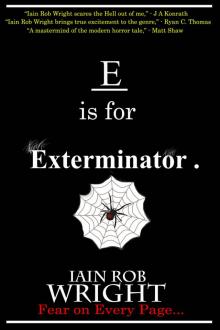 E is for Exterminator (A-Z of Horror Book 5)
E is for Exterminator (A-Z of Horror Book 5)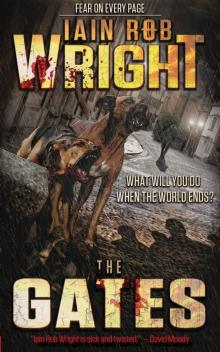 The Gates: An Apocalyptic Novel
The Gates: An Apocalyptic Novel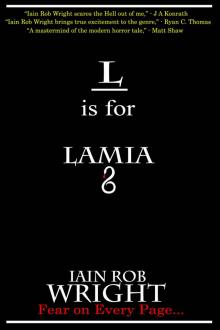 L is for Lamia (A-Z of Horror Book 12)
L is for Lamia (A-Z of Horror Book 12)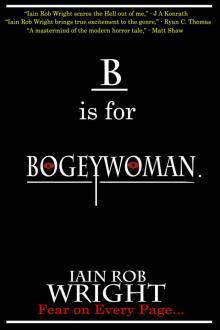 B is for Bogeywoman (A-Z of Horror Book 2)
B is for Bogeywoman (A-Z of Horror Book 2)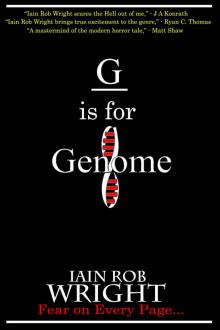 G is for Genome (A-Z of Horror Book 7)
G is for Genome (A-Z of Horror Book 7)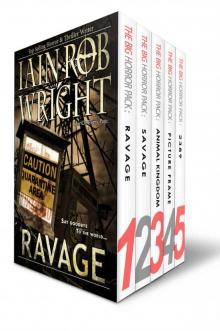 The BIG Horror Pack 2
The BIG Horror Pack 2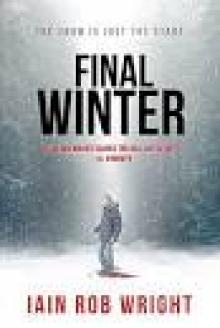 The Final Winter: An Apocalyptic Horror Novel
The Final Winter: An Apocalyptic Horror Novel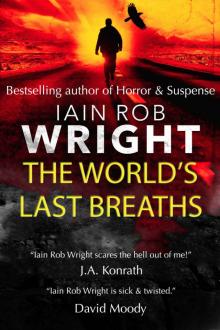 The World's Last Breaths: Final Winter, Animal Kingdom, and The Peeling
The World's Last Breaths: Final Winter, Animal Kingdom, and The Peeling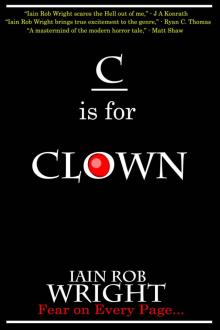 C is for Clown (A-Z of Horror Book 3)
C is for Clown (A-Z of Horror Book 3)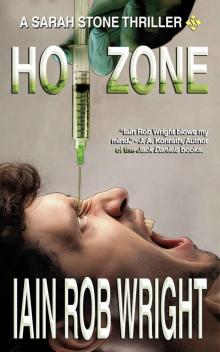 Hot Zone (Major Crimes Unit Book 2)
Hot Zone (Major Crimes Unit Book 2)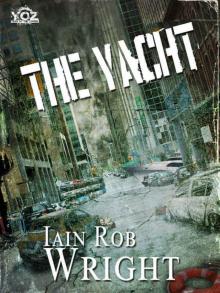 The Yacht (Year of the Zombie Book 3)
The Yacht (Year of the Zombie Book 3)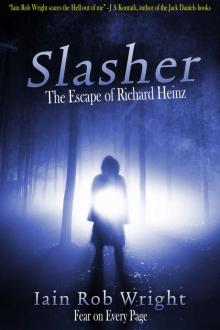 Slasher: the Escape of Richard Heinz
Slasher: the Escape of Richard Heinz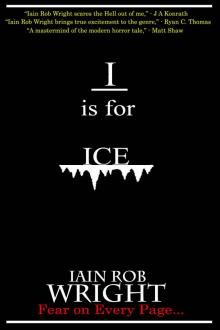 I is for Ice (A-Z of Horror Book 9)
I is for Ice (A-Z of Horror Book 9)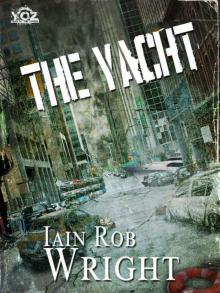 Year of the Zombie (Book 3): The Yacht
Year of the Zombie (Book 3): The Yacht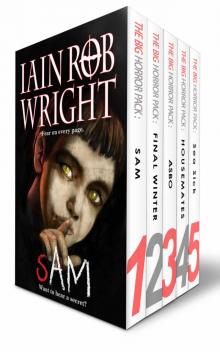 The BIG Horror Pack 1
The BIG Horror Pack 1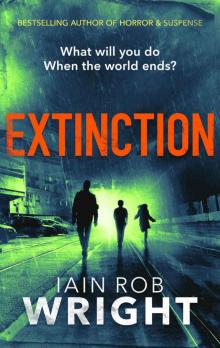 Extinction: An Apocalyptic Horror Novel (Hell on Earth Book 3)
Extinction: An Apocalyptic Horror Novel (Hell on Earth Book 3)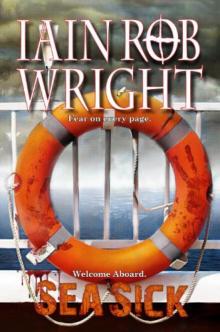 Sea Sick: A Horror Novel
Sea Sick: A Horror Novel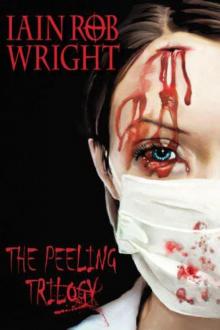 The Peeling Trilogy
The Peeling Trilogy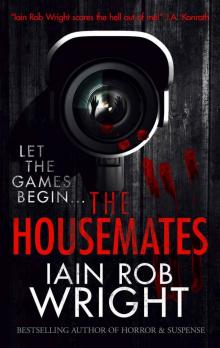 The Housemates: A Novel of Extreme Terror
The Housemates: A Novel of Extreme Terror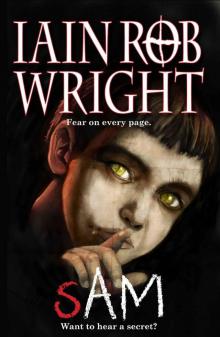 Sam
Sam